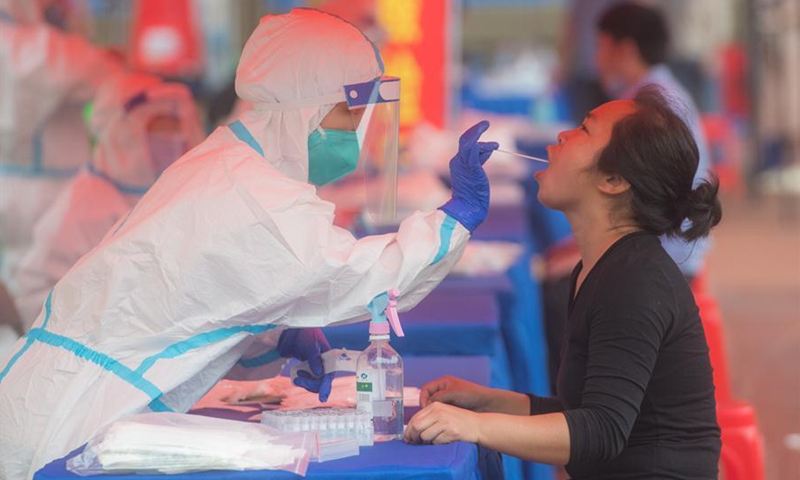Strain in Beijing COVID-19 outbreak not like the type circulating in China: CDC chief epidemiologist
By Liu Caiyu and Zhao Juecheng Source:Global Times Published: 2020/6/14 13:38:35

A resident takes the nucleic acid test at a testing post set up at a primary school in Dongxihu District in Wuhan, central China's Hubei Province, May 15, 2020. Wuhan will arrange nucleic acid tests for all residents who have not been tested before, in order to better know the number of asymptomatic cases of the novel coronavirus. The decision was made as the virus-ravaged city continued to report daily increases of asymptomatic infections, which raised concerns among the public. (Xinhua/Xiao Yijiu)
Beijing is going through an important test in its fight against COVID-19, and if it is not handled well, will cause a second wave of the outbreak, according to the chief epidemiologist of the Chinese Center for Disease Control and Prevention.
"Like the rest of the country, most of the population in Beijing is susceptible to COVID-19. Fortunately, Beijing found it early and moved fast," Zeng Guang, the CDC epidemiologist, told Chinese media on Saturday, warning that the Beijing regional outbreak could bring a second wave.
This test that Beijing is going through is the biggest one after the whole country experienced a calm period, Zeng noted.
Zeng revealed that preliminary results from viral gene sequencing show that the virus strain in Beijing this time does not resemble the type widely circulating in the country.
Two samples have already been tested, and more tests are needed to determine where the epidemic is headed, he noted.
Chen Xi, an associate professor of public health at Yale University, also suggested making a comparison of types of viral gene sequencing from different countries, to determine whether the virus detected in Beijing is from the origin nations of salmon.
The novel coronavirus was detected on a chopping board used by a seller of imported salmon at Xinfadi market. China imports about 80,000 tons of chilled and frozen salmon each year, mainly from Chile, Norway, Faroe Islands, Australia and Canada, according to news site Jiemian.com.
A preliminary investigation showed those confirmed cases may have been in contact with the contaminated environment at the Xinfadi Market or had contact with people who were affected, Pang Xinghuo, deputy director of Beijing municipal center for disease prevention and control, said at a press conference on Saturday.
She said the possibility of more COVID-19 infections cannot be ruled out.
Beijing reported 36 more confirmed COVID-19 cases on Saturday, health authorities said on Sunday. Twenty-seven worked at the Xinfadi Market and nine others had a direct or indirect connection with the market.
As of press time, Beijing had reported a total of 43 confirmed cases over three consecutive days.
The Beijing Xinfadi Market became a new COVID-19 hot spot after confirmed cases reported in the capital city in the last three days were all traced back to the city's largest vegetables wholesale market.
Chen told the Global Times on Sunday that residents don't have to worry about the outbreak in Beijing as present, as China has gained vast experience in fighting against COVID-19, first from Wuhan, then Shulan in Northeastern China.
Beijing is capable of preventing the sporadic cases from spreading, Chen believed.
RELATED ARTICLES:
Posted in: SOCIETY